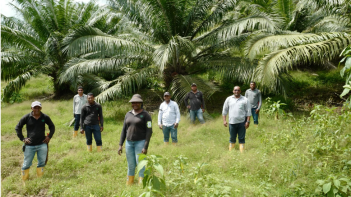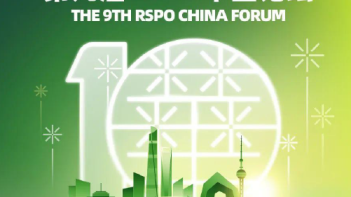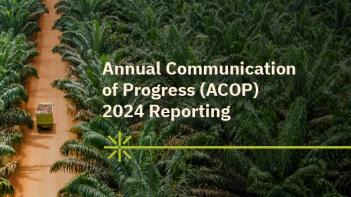|
Click icon to download PDF |
On June 24th, the RSPO requested five of its member companies, which the media reported to be implicated in the forest fires in Sumatra, to submit digital maps of their concession areas in Indonesia. The companies include Sime Darby, Kuala Lumpur Kepong (KLK), Golden Agri Resources (GAR), Tabung Haji Plantations, and PT Jatim Jaya Perkasa.
As of July 9th, four of these five companies have submitted digital maps in a format appropriate for analysis. PT Jatim Jaya Perkasa has submitted concession information that cannot be used for precise analysis, and the RSPO has requested that the company submit digital map files in a more usable format.
Fire alerts within company boundaries were analyzed separately by the World Resources Institute (WRI) and Malaysian scientist and Geographic Information System (GIS) expert Dr. Khali Aziz Hamzah from Forest Research Institute Malaysia (FRIM).
Dr. Hamzah overlaid concession boundaries provided by the companies with Active Fire Data from the National Aeronautics and Space Administration (NASA) for the 1st to the 26th of June, 2013. According to this analysis, all fire alerts in the company concessions listed above lasted for less than 24 hours. Results, data, and maps are available for consultation here: (https://rspo.org/wp-content/uploads/MAP ANALYSIS-KLK,GAR,SIMEDARBY_FINAL10july.pdf).
Independently, WRI overlaid company concession boundaries with Active Fire Data provided by NASA for the entire month of June. More information on NASA’s alerts system is available here: (http://earthdata.nasa.gov/data/near-real-time-data/firms)
The table below summarizes WRI’s findings:
Note: None of the fire alerts detected on the company concessions listed above lasted more than 24 hours.
The analysis has been carried out solely on the concessions that the RSPO has specifically requested, which were reported to be implicated in the forest fires in Indonesia through various media and online platforms. A full list of the provided concession boundaries is available on the RSPO website. Further information (such as boundaries for planted areas, boundaries of smallholder areas (known in Indonesia as ‘plasma’), and other contextual information) is not included in this analysis.
The concession maps currently in the public domain, from Indonesia’s Ministry of Forestry and other agencies, do not align with the maps provided by the companies above. Further clarification is therefore needed from these agencies about the precise concession boundaries.
Public transparency on issues of land use and land ownership is essential to addressing the question of responsibility for fires the annual haze problem. Companies and governments should work together to provide consistent concession boundaries to the public, including concessions not certified by the RSPO. This would include all relevant company holdings, joint ventures, and the concessions of exclusive suppliers. The RSPO appreciates the challenge of collating and verifying this information for companies and the Government of Indonesia. Nevertheless, the RSPO extends its hand to aid in this effort, where possible. RSPO calls on other stakeholders to do the same, and to support projects such as Indonesia’s important OneMap Initiative.
The recent fires in Indonesia also represent an opportunity for RSPO and its members to play a positive role to help other companies and governments mitigate, or avoid altogether, the annual fires and haze in South East Asia. The RSPO firmly believes that mitigating or avoiding fires on peat systems require landscape level collaboration and management.
The RSPO thanks the members who have cooperated in this process and commends those who took quick action to detect and quell the fires in their concessions.
The RSPO firmly encourages its members with existing plantations on peat and elsewhere to adopt fire prevention measures within their concessions. For further guidance, kindly refer to RSPO’s Peat Best Management Practices (BMP).
Keep reading

Call for Expression of Interest: Independent Investigation of a Complaint

Latin American Smallholders, Key Global Brands Gather in Peruvian Amazon to Advance Sustainable Palm Oil

RSPO Forum for Members and Certification Bodies 2025: Strengthening Capacities and Building Bridges with RSPO Members

From Violence to Prosperity: Cultivating Sustainable Palm Oil in San Pablo, Colombia

Palmas de Tumaco: Enduring, Trusting, and Transforming in Colombia’s Pacific Coast
Carry Over Credits for Certified Independent Smallholder Groups

From the Amazon to the Aisles: Discovering Sustainable Palm Oil in the Heart of Peru

Global Trends of Sustainable Palm Oil and China's Pathway




